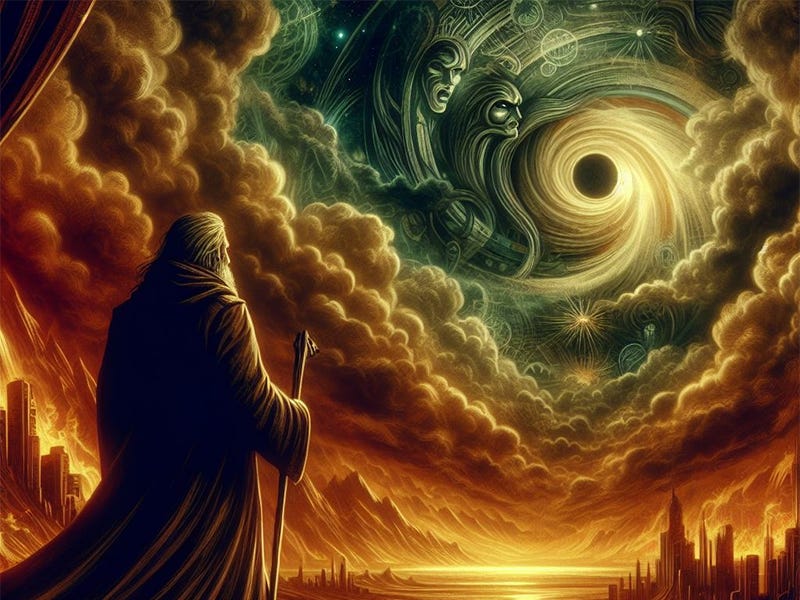Anyway by popular demand [not!], I thought I might post about one of the other proofs, or 'ways' of Aquinas:
"V. Proof from Final Causes, or the Teleological Argument, often known as Intelligent Design
Not a few of the highly respected philosophers and scientists of history and the present day felt, and feel, that the world as we know it, nature as it were, shows signs of a strange order or purposefulness, as opposed to randomness or pure chance, and this, it is felt, proves the existence of some being responsible for arranging this order. Predictably enough (!) I will try to explain this using an analogy but, mercifully, I will spare you any reference to watches or clocks! It is in fact one of the most peculiar aspects of the historiography of this question that virtually all the great thinkers start talking about watches and clocks when seeking to explain this proof. It really is very remarkable, it starts all the way from Cicero, and he was only talking about sundials!, to Robert Boyle, who talked about the Strasbourg town clock, to Voltaire, to William Paley – a Church of England rector who wrote one of the most influential books in history on this subject: ‘Natural Theology,’ published in 1802 – who famously talked about a watch found on a heath etc etc. Instead, by way of something different, I will begin with our hero marooned on a romantic desert island, trudging through the forest on his lonely atoll and suddenly coming across a trap, an elaborate Indiana-Jones-type large animal trap:
Naturally you move to examine it and find that it has a rope net which is designed to capture any large animal that falls into the corresponding hole that the trap maker has dug. The hole is just a large rectangular job and the rope, which is wide and sturdy, is just made from slashing together vines that abound in this forest. Of course you look at this trap and you immediately say “there is somebody out there, we are not alone!”, and no, you are not referring to aliens! This then is the basic idea of this proof, we see the same type of organised purposeful design in nature and we conclude that we are not alone, there must be a designer behind this design.
To get back to our Robinson Crusoe hero here, obviously he reached the natural conclusion anybody would reach having seen that elaborately designed trap. But why, exactly? How do you know there is somebody else on the island now that you have seen this trap? There are other holes in the forest of course, made randomly around the place by rabbits and other animals and by trees falling over etc, maybe the hole you were looking at arose that way? Sometimes the vines that you see hanging down from the trees intertwine a bit, so is that how the rope was made? We will say that you pause and consider this question, was this trap created by random forces like rabbits and the wind creating the rope by winding the vines together like that? And therefore there might not be anybody out there, it could be just natural forces and not the result of an intelligent designer, because what you had thought at first was that there must be some intelligent resourceful guy on this island, seeing as somebody like that had to have built such a crafty trap. But could it have come about then by these natural sources? Well, as you think about it, indeed the parts used in the trap were all natural, they were all around each other in the forest, so yes in theory the wind and rabbits etc could have created the trap.
But no, now that you give it more thought it couldn’t have happened like that because the trap was too structured or ordered. For example you are looking at the hole and you see it has four pretty sharp sides, as in a rectangle, and how could you have rabbits creating a large perfect rectangular hole like that? In theory they could have of course, you could have ten rabbits lined up together who start digging in unison etc etc, I mean it could happen, in theory? There is no law states that rabbits cannot form a line? But in reality we know that didn’t happen, and the reason is that we know that things cannot form that ordered or structured pattern by chance or randomness alone. What you could do is calculate the odds in your mind. You could picture the day you watched a few rabbits eating in a field and you could guess the odds of two rabbits lined up in perfect unison and then calculate the odds of 10 rabbits lined up like that. As you calculate the odds you rapidly realise that it just couldn’t happen and what you are doing in your head is the classic, and indeed only, way of distinguishing the two states of randomness and design. Basically you have design, i.e. somebody, a human or some being with intelligence, deliberately bringing about this state, taking over from randomness and chance, i.e. the outcome of natural undirected forces in nature, like wind or rain or something, as the only possible explanation when you find these huge odds stacking up, like the odds of rabbits coming together like that. Remember you never find that there is zero odds, there is always some chance that ten rabbits could line up in unison like that, because as I said there is no law against it, but when the odds start to get astronomical then you know it was design.
I will come back to that question of probabilities in a minute but lets look at some other aspects of the trap. You see you also have to consider that the wind would have to have arranged the vines in a rope or net structure at just the right time and place to coincide with the hole, and what are the odds of that? The point then is that when we see a kind of purposeful interlocking structure – I say purposeful because obviously the designer had put the hole in front of the net like that ‘on purpose,’ and you can note with interest that purposefulness – then the probabilities of it happening by chance, again, rise astronomically.
The other thing to remark on about the trap is that it doesn’t have to be perfect to show intelligent design. Say for the sake of argument that in one corner of the rectangular hole there is a small collapse in the earthwork. Hence it isn’t actually a perfect rectangular chasm, but still we can see that enough of the design of the whole remains that will show us that it couldn’t have come about by chance. So, in short, even though it isn’t actually a perfect rectangle nonetheless its close enough to rule out the rabbit theory. This is an important point because when we come to talking about DNA etc in a minute you will hear some people say that the intelligent design in nature is actually not perfectly designed – because after all we have cancer cells that use the DNA structure for example – to support life, but I would say it doesn’t have to be, as long as enough of it remains that does show the design.
In any case hopefully at this stage you get the general idea, the way to distinguish design from chance, that is two competing possibilities if you like, opposed to one another, is to check the probabilities. If the probabilities become astronomically high – but they never hit zero remember, when we are trying to distinguish randomness from design – then it is design, and that is what our hero did instinctively when he first saw the trap, he knew that some intelligent being had to have designed it.
You see this is what any intelligent person does on an ongoing basis. Say you were playing cards and your opponent got three aces dealt into him. Well it happens and you will congratulate him on his luck. Then it happens again on the next hand. That is certainly a talking point and everybody will be remarking on how lucky the guy was but I guess these things happen. But by the time it happens on the third hand you are going to react differently. Now you know it isn’t luck and you will be quietly fixing an eagle eye on your opponent’s sleeve! So what is happening here? You are calculating the odds of it happening by chance in your head. It could happen once, sure, happen twice, yes but very rare, but happen three times in a row? Now you have calculated that last probability in your head and you can see that those odds are ridiculous and you move to the design option, you know somebody has done that deliberately, you know that because the odds of it happening by chance have become astronomical. Remember the odds of it happening three times in a row are not zero, they never are under this type of analysis, but once they hit very big numbers then you know it is design – your opponent somehow did this deliberately, purposefully – and not by chance – it was not the mere random shuffling of the cards.











